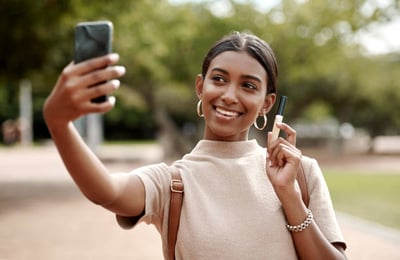May 19, 2020
 by Brandon Brown / May 19, 2020
by Brandon Brown / May 19, 2020

There’s no doubt that the relationship between influencer and audience is pivotal.
With an authentic bond, the influencer is a trustworthy source of advice, a fellow traveler who has succeeded in some part due to their obvious passion. Through their content, they lovingly show followers how they might find success, teaching them to trust themselves.
The dynamic between an influencer and their community, should align with the influencer and brand for a number of reasons.
Brands and influencers need a compelling connection, too. Products must align with an influencer’s subject matter and values, on top of the interests of their followers. In addition, influencers and their brand partners need an authentic, positive and creative relationship, without which neither compelling content nor long-term collaboration is possible.
Your search should begin with the audience you hope to reach. Consider the demographics you’re targeting, the topics they have the most interest in, and whom they tend to follow on social media. Find the influencers they follow, and determine which are most successful in getting their followers excited about products and partnerships.
When comparing influencers, consider audience data like household income, brand affinities and interests. Consider using influencer analytics to use relevant information to identify the right influencer for your marketing efforts. Perhaps more importantly, any likely candidate needs the following quality: authenticity.
How does one identify authenticity? Authenticity is easier to determine than define. Authentic influencers engage with their followers without flooding their feed with sponsored ads. How influencers respond to comments left by fans, if they bother to do so at all, speaks volumes about their authenticity. Do they seem curious about their fans’ questions and concerns, or does their feed read like a one-way street?
What’s more, the content needs to be authentic, too. Look to see whether the influencer has an undeniable passion for their subject area, and whether they convey entertaining or insightful content through a distinct and trustworthy point-of-view.
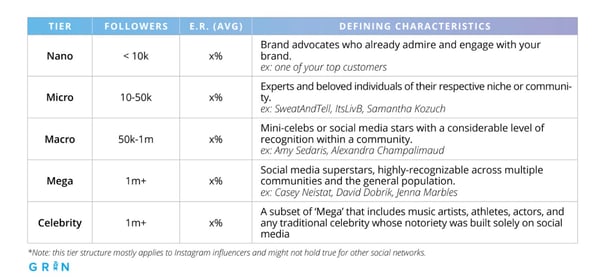
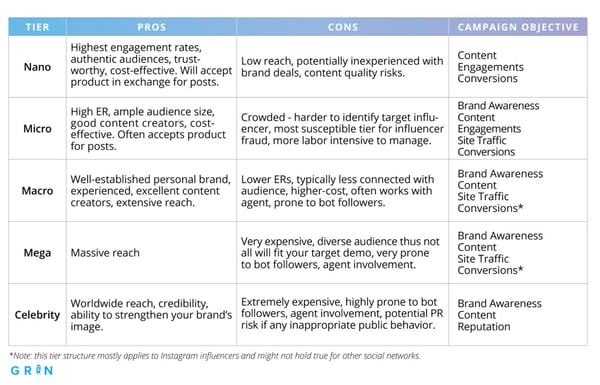
The key difference between a series of transactions and a relationship is that the influencer has a sincere interest in your product and brand, and is not just interested in the offer. Your goal is not just to earn a positive mention, it’s to get your influencer to showcase your product in a way that transfers their enthusiasm to their followers.
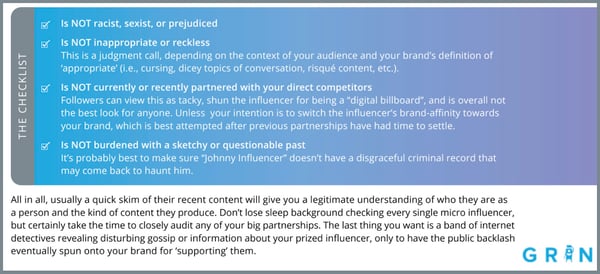
Authenticity should be felt from the first interaction if you hope to foster an authentic relationship. It’s still a business relationship, of course, but think of your influencers more like brand ambassadors than a paid media channel.
For those accustomed to purely transactional business relationships, this requires a great deal more informality. Since we’re all consistently exposed to advertising and messaging, we’re generally aware when people are speaking to us or when they’re talking at us.
Familiarizing yourself with any potential influencer is a must, and should be done ideally during the selection and evaluation phase. Read their posts, blog entries and comments; notice the qualities their most engaging posts have as well. Also, make a point to look at any previous sponsorships they’ve done. Determine whether the promotions felt like a natural fit for the content creator, and see how their followers react.
And don’t just skim the content, be an active participant, too. Like their posts, comment authentically, but only when you’re confident that it adds value. This way, they’ll remember you when you begin your official outreach.
When you begin reaching out to contact influencers, write like you’re talking to a good friend about good news. Your initial emails should be about introducing yourself, conveying that you’re looking for an (ideally) long-term relationship, gauging their interest in a potential relationship and hearing any thoughts they have about the audience fit.
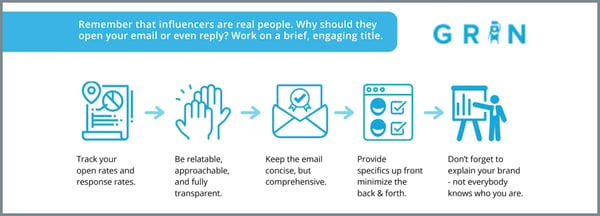
Across industry verticals, business relationships are viewed as either low-touch with few parameters or high-touch with strict parameters. And while low-touch business relationships work just fine in a variety of low-stakes partnerships where there exist many competitive alternatives, that’s simply not the case for influencers.
You want to be something in-between, both involved and interested, while still allowing for creative freedom. Influencers need space and a high degree of creative control to ensure that content is engaging and presented in their voice. Creative control was the most frequently cited deciding factor when influencers opt to work with brands again.
This doesn’t mean that you allow for 100 percent freedom. Instead, it’s more important from the outset to be clear and specific about what you want and don’t want, with the understanding that the process is ultimately a good-faith negotiation.
To be clear: we’re not being metaphorical when we say that your influencer relationship should be authentic. Your connection should be personal and informal and shouldn’t fall off once a contract is signed.
Since their brand is intrinsically tied to their personality, your understanding of their character and qualities should inform the content of your collaboration, and the tone of your relationship. Forming an authentic relationship is a necessity. Influencers generally feel this way, too.
It’s especially important to be aware of this reality when discussing compensation. Remember that some influencers will ask for monetary compensation, not just free product.
Needless to say, if you intend to pay your influencer, be certain you understand their expectations. If you don’t know where to begin, get up to speed with proper compensation for influencers and best practices on influencer payments.
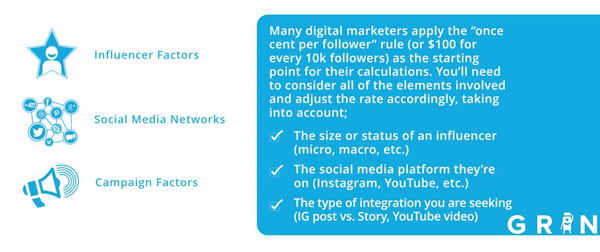
While product and monetary compensation are two of the most common things you can offer your influencer, don’t miss opportunities to strengthen your partnership by thinking outside the box.
Sponsor trips and personalized opportunities for your influencers. You can pay their way to a destination relevant to their interests, help them invest in business needs or help in any number of ways.
Think of opportunities that can generate exposure for both sides of the relationship, like, for instance:
Getting exclusive new experiences and opportunities that can be shared with followers is the second most often cited deciding factor for influencers comparing opportunities.
Such opportunities not only strengthen relationships for the long-term, they also lead to compelling sponsored content. By showering your influencer with attention and fun experiences, you convey to fans and followers that your brand understands and values your influencer’s unique qualities, effectively endearing them to your brand.
Like any authentic real-life friendship, an influencer relationship should maintain consistent communication and respect. Ensure that there’s at least one consistent point-person to manage this relationship. This person can serve as both a brand advocate to the influencer and an influencer advocate to the broader organization.
While this may feel like a great expense, the more care and attention you provide, the more likely you’ll find your influencers to be willing volunteers when an occasion arises to return the favor.
That’s not to say you should awkwardly insert yourself deep into their lives. Instead, take every opportunity to reaffirm – or potentially expand – your existing relationship. After all, influencers are people, not companies, which means a personal touch goes a long way.
If you’re out of ideas, offer influencers these goodies to keep them involved:
What’s more, long and consistent partnerships can create a much deeper and longer-lasting impression in the minds of followers. The repetition keeps your brand top-of-mind, additionally shows off the versatility of your products and services, and further conveys trust and credibility.
One critical method of keeping influencer relations healthy is giving them greater involvement in your brand.
So long as your influencers have an authentic relationship with your target audience, their experience and expertise can bring insight into a whole host of functions, like product design, market trends, strategy or providing consumer feedback, among other creative consulting projects.
Product collaborations, in particular, are most common in the beauty and fashion industries. However their utility extends to a great deal more professions. For instance, take Jenn IM, a YouTube beauty influencer and fashion designer. She was approached by indie makeup brand ColourPop to collaborate on designing a new branded makeup line. The ensuing product line, ColourPop X Jenn Im, was released for a limited time and was quickly deemed a must-have.
And not only is this a chance for higher sales and greater exposure, but creative projects also help further align your mutual business interests. This brings more opportunities for cross-marketing and helps create an authentic bond through an earnest collaboration aimed at a common goal.
Authenticity is the glue that bonds audiences to influencers, influencers to brands and brands to audiences. But by definition, it can’t be forced. Instead, it must be cultivated organically through trust in the influencer’s creative capabilities, and positive reinforcement. Only then can they bridge the gap between your brand and their followers.
Learn everything you need to know and more about influencer marketing and how to make sure your influencer relationships stay top-notch.
Brandon Brown is the CEO of Grin, an influencer marketing software solution for brands. He previously led marketing for Red Bull North America. He is an expert in consumer marketing and has experience working with brands to reach consumers through influencers, athletes, musicians, and artists.
In this digital age, success isn't solely determined by what you know but also by who you know.
 by Hardy Desai
by Hardy Desai
Customer relations are the bread and butter of a strong brand strategy.
 by Guy Avigdor
by Guy Avigdor
So, you’re ready to delve into the world of influencer marketing.
 by Trelawney Erwin
by Trelawney Erwin
In this digital age, success isn't solely determined by what you know but also by who you know.
 by Hardy Desai
by Hardy Desai
Customer relations are the bread and butter of a strong brand strategy.
 by Guy Avigdor
by Guy Avigdor


